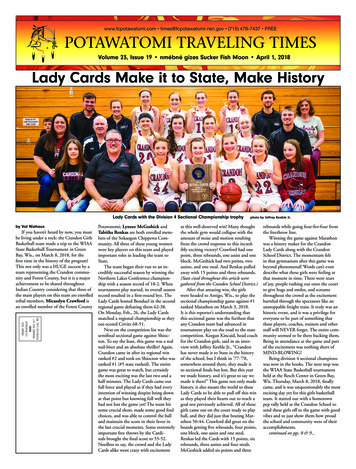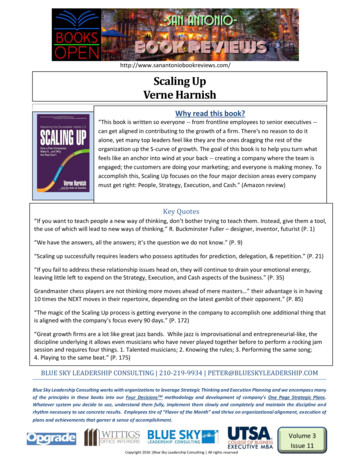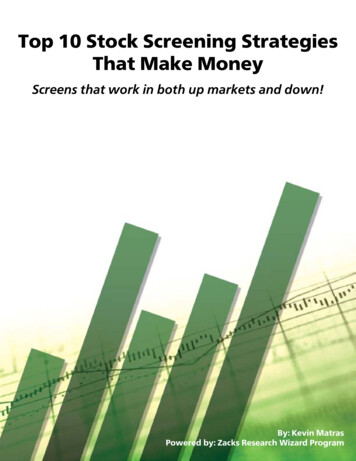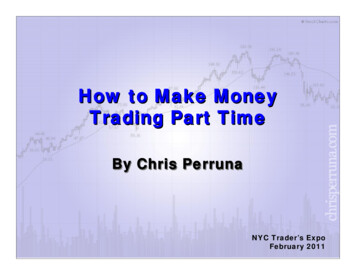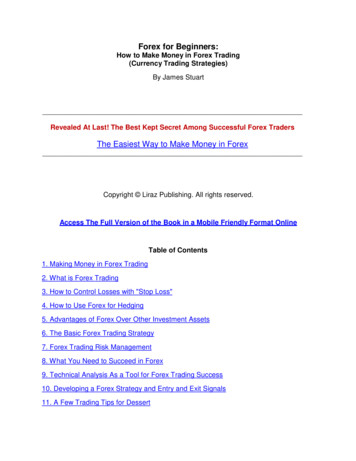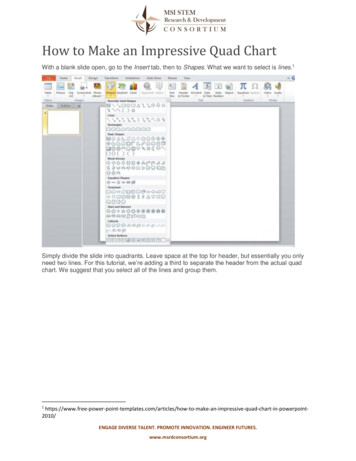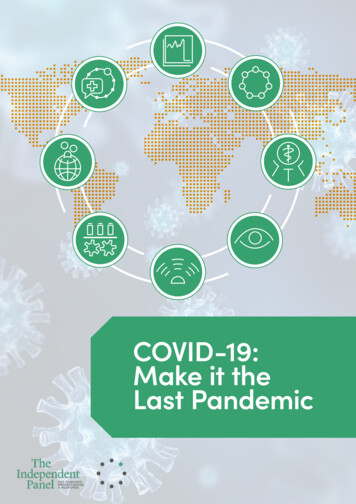
Transcription
COVID-19:Make it theLast Pandemic
Disclaimer:The designations employed and the presentation of the material in this publication do not implythe expression of any opinion whatsoever on the part of the Independent Panel for PandemicPreparedness and Response concerning the legal status of any country, territory, city of area orof its authorities, or concerning the delimitation of its frontiers or boundaries.Report Design: Michelle Hopgood, Toronto, CanadaIcon Illustrator: Janet McLeod WortelMaps: Taylor BlakeCOVID-19: Make it the Last Pandemic by The Independent Panel for Pandemic Preparedness & Response 2 of 86
ContentsPreface 4Abbreviations 61. Introduction 82. The devastating reality of the COVID-19 pandemic 103. The Panel’s call for immediate actions to stop the COVID-19 pandemic 124. What happened, what we’ve learned and what needs to change 154.1Before the pandemic — the failure to take preparation seriously 154.2A virus moving faster than the surveillance and alert system 214.2.1 The first reported cases 4.2.2 The declaration of a public health emergency of international concern 4.2.3 Two worlds at different speeds 2224264.328Early responses lacked urgency and effectiveness 4.3.1 Successful countries were proactive, unsuccessful ones denied and delayed 4.3.2 The crisis in supplies 4.3.3 Lessons to be learnt from the early response 3133364.438The failure to sustain the response in the face of the crisis 4.4.1 National health systems under enormous stress 4.4.2 Jobs at risk 4.4.3 Vaccine nationalism 3838415. The Independent Panel’s recommendations 456. A roadmap forward 62Terms of reference for the Global Health Threats Council 717. About the Panel and its work 75Acknowledgements 80References 83
PrefaceThe COVID-19 pandemic is a sign of how vulnerableand fragile our world is. The virus has upended societies,put the world’s population in grave danger and exposeddeep inequalities. Division and inequality between andwithin countries have been exacerbated, and the impacthas been severe on people who are already marginalizedand disadvantaged. In less than a year and a half,COVID-19 has infected at least 150 million peopleand killed more than three million. It is the worstcombined health and socioeconomic crisis in livingmemory, and a catastrophe at every level.The new millennium has seen the havoc which global health threats likesevere acute respiratory syndrome (SARS), Ebola and Zika can cause.Experts have been warning of the threat of new pandemic diseasesand urged major changes in the way we protect against them — but thechange needed has not come about. As soon as a health threat or deadlyoutbreak fades from memory, complacency takes over in what has beendubbed a cycle of panic and neglect. This cycle must end.COVID-19 is the 21st century’s Chernobyl moment — not because a diseaseoutbreak is like a nuclear accident, but because it has shown so clearly thegravity of the threat to our health and well-being. It has caused a crisis sodeep and wide that presidents, prime ministers and heads of internationaland regional bodies must now urgently accept their responsibility totransform the way in which the world prepares for and responds to globalhealth threats. If not now, then when?Our message for change is clear: no more pandemics.If we fail to take this goal seriously, we will condemnthe world to successive catastrophes.At the same time, our careful scrutiny of the evidence has revealed failuresand gaps in international and national responses that must be corrected.Current institutions, public and private, failed to protect people from adevastating pandemic. Without change, they will not prevent a future one.That is why the Panel is recommending a fundamental transformationdesigned to ensure commitment at the highest level to a new systemthat is coordinated, connected, fast-moving, accountable, just, andequitable — in other words, a complete pandemic preparedness andresponse system on which citizens can rely to keep them safe and healthy.COVID-19: Make it the Last Pandemic by The Independent Panel for Pandemic Preparedness & Response 4 of 86
Given the devastation of this pandemic and its impact on peopleeverywhere, our findings are necessarily tough, and our recommendationsactionable.Since September 2020, the Independent Panel has learned from manystakeholders — front-line health workers, women, youth, mayors, ministers,scientists, chief executive officers, international officials and diplomats. Wehave also heard loud and clear that citizens are demanding an end to thispandemic, and that is what they deserve. It is the responsibility of leadersof all countries, as duty bearers, to respond to these demands.The pandemic is not yet over — it is still killing more than 10 000 peopleevery day. Our recommendations are therefore directed first to theimmediate measures needed to curb transmission and to begin worknow to strengthen future protections. People in many countries continueto suffer successive waves of infection - hospitals have again filled withCOVID-19 patients, and families are losing loved ones. The vaccinesavailable are a scientific triumph, but they must now be delivered acrossthe globe. At the time of writing, fewer than one in 100 people in lowincome countries had received a first dose — a graphic demonstration ofglobal inequality. As the virus spreads, it is also mutating and creatingnew challenges.We must work together to end this pandemic, and we must act urgentlyto avert the next. Let history show that the leaders of today had thecourage to act.Rt Hon. Helen ClarkH.E. Ellen Johnson SirleafMauricio CárdenasDavid MilibandAya ChebbiThoraya ObaidMark DybulPreeti SudanMichel KazatchkineErnesto ZedilloJoanne LiuZhong NanshanCo-ChairCo-ChairPrecious MatsosoCOVID-19: Make it the Last Pandemic by The Independent Panel for Pandemic Preparedness & Response 5 of 86
AbbreviationsACT-AAfrica CDCCEPICOVAX FacilityCOVID-19Global FundIHR HAWTOAccess to COVID-19 Tools AcceleratorAfrica Centres for Disease Control and PreventionCoalition for Epidemic Preparedness InnovationsCOVID-19 Vaccines Global Access Facilitycoronavirus diseaseGlobal Fund to Fight AIDS, Tuberculosis and MalariaInternational Health Regulations (2005)International Monetary FundMiddle East respiratory syndromeMember Statesofficial development assistancepublic health emergency of international concernpersonal protective equipmentProgram for Monitoring Emerging Diseasesresearch and developmentsevere acute respiratory syndromesevere acute respiratory syndrome coronavirus 2World Health AssemblyWorld Trade OrganizationCOVID-19: Make it the Last Pandemic by The Independent Panel for Pandemic Preparedness & Response 6 of 86
Credit: RosemWatsamonMortonTri-Yasakda
1. IntroductionThe world is still in the midst of a pandemic that hasspread wider and faster than any in human history.The social and economic crisis precipitated by COVID-19is affecting families, communities and nations acrossthe globe.Seized by the gravity of the crisis, in May 2020 the World HealthAssembly requested the Director-General of WHO to initiate an impartial,independent, and comprehensive review of the international healthresponse to COVID-19 and of experiences gained and lessons learnedfrom that, and to make recommendations to improve capacities for thefuture. The Director-General asked H.E. Ellen Johnson Sirleaf and theRt Hon. Helen Clark to convene an independent panel for this purposeand to report to the World Health Assembly in May 2021.The Panel has taken a systematic, rigorous and comprehensive approachto its work. It has sought to listen to and learn from a wide range ofinterlocutors. Since mid-September 2020, the Panel has reviewedextensive literature, conducted original research, heard from expertsin 15 round-table discussions and in interviews, received the testimonyof people working on the front lines of the pandemic in town-hall-stylemeetings, and welcomed many submissions from its open invitationto contribute.The Panel has examined the state of pandemic preparedness priorto COVID-19, the circumstances of the identification of severe acuterespiratory syndrome coronavirus 2 (SARS-CoV-2) and the diseaseit causes, coronavirus disease (COVID-19), and responses globally,regionally and nationally, particularly in the pandemic’s early months.It has also analysed the wide-ranging impact of the pandemic andthe ongoing social and economic crisis that it has precipitated.This report presents the Panel’s findings on what happened, the lessonsto be learned from that, and our recommendations for strategic actionnow to end this pandemic and to ensure that any future infectious diseaseoutbreak does not become a catastrophic pandemic.Complementing this report, the Panel presents a companion reportdescribing thirteen defining moments which have been pivotal in shapingthe course of the pandemic. In addition, the Panel is publishing a seriesof background papers representing in-depth research including achronology of the early response.COVID-19: Make it the Last Pandemic by The Independent Panel for Pandemic Preparedness & Response 8 of 86
The recommendations are ambitious and crucial. The Panel believes thatthe international system requires fundamental transformation to preventa future pandemic. The Panel calls on political decision-makers at everylevel to champion major change and to make available the resources tomake it effective. The ask is large and challenging, but the prize is evenlarger and more rewarding. With so many lives at stake, now is the timefor resolve.The ask is large and challenging, but the prize is evenlarger and more rewarding. With so many lives at stake,now is the time for resolve.COVID-19: Make it the Last Pandemic by The Independent Panel for Pandemic Preparedness & Response Credit: Tuane Fernandes Silva9 of 86
2. The devastating realityof the COVID-19 pandemicCOVID-19 has shown how an infectious disease can sweepthe globe in weeks and, in the space of a few months, setback sustainable development by years.By all measures, the impact of the pandemic is massive: 148 million people were confirmed infected and more than3 million have died in 223 countries, territories and areas(as at 28 April 2021) (1); at least 17 000 health workers died from COVID-19 duringthe pandemic’s first year (2); US 10 trillion of output is expected to be lost by the end of 2021,and US 22 trillion in the period 2020–2025 — the deepest shock tothe global economy since the Second World War and the largestsimultaneous contraction of national economies since the GreatDepression of 1930–32 (3); At its highest point in 2020, 90% of schoolchildren were unableto attend school (4); 10 million more girls are at risk of early marriage becauseof the pandemic (5); gender-based violence support services have seen fivefoldincreases in demand (6); 115–125 million people have been pushed into extreme poverty (7).The language of health statistics and economics cannot convey thedepth of disruption as COVID-19 has overturned people’s lives. Peopleare grieving the loss of their loved ones, and those with long-term healthimpacts from the disease continue to suffer. There are instances wherepeople with cancer have been unable to attend chemotherapy sessions,and people with suspected tuberculosis have not been diagnosed ortreated. Market sellers have been unable to work and put food on thetable. Women have found their double workload tripled or quadrupled,as they try to maintain the family income, care for the elderly and sick,become teachers for their home-schooled children, and maintain thewell-being of their families.Most dispiriting is that those who had least before the pandemic haveeven less now. The experience of previous epidemics shows that incomeinequality increased in affected countries over the five years followingeach event. Those working in the informal sector have had little or nosupport. Migrants, refugees, and displaced people have often beenCOVID-19: Make it the Last Pandemic by The Independent Panel for Pandemic Preparedness & Response 10 of 86
shut out of testing services and health facilities. Perhaps 11 million of thepoorest girls in the world may never go back to the classroom (8). Peopleliving in the poorest countries are at the tail-end of the vaccine queue.It does not have to be this way.A groundswell of opinion is determined to address inequality so thatwe can come out of the pandemic looking forward to a better world,sustaining and expanding responses where they have shown a betterpath. Governments have offered income support to millions of people inplaces where, before the pandemic, that had been considered a politicalimpossibility. Campaign-based health services, like immunization, havebounced back rapidly. Service delivery in health is being changed for thebetter through people-centred initiatives, such as those in telemedicine orwith the multi-month dispensing of medications. The links between greenand sustainable futures and a pandemic-free world are being drawnmore clearly than ever before.Ending this pandemic as quickly as possible goes hand in hand withpreparing to avert another one. Paying attention to what went wrong, aswell as to what went right, will be invaluable pointers to ways in which theworld can get back on track to realise the 2030 Agenda for SustainableDevelopment.This pandemic has shaken some of the standard assumptions that acountry’s wealth will secure its health. Leadership and competencehave counted more than cash in pandemic responses. Many of the bestexamples of decisive leadership have come from governments andcommunities in more resource-constrained settings. There is a clearopportunity to build a future beyond the pandemic that draws on thewellsprings of wisdom from every part of the world.COVID-19: Make it the Last Pandemic by The Independent Panel for Pandemic Preparedne
COVID-19: Make it the Last Pandemic by The Independent Panel for Pandemic Preparedness & Response 8 of 86 1. Introduction The world is still in the midst of a pandemic that has spread wider and faster than any in human history. The social and economic crisis precipitated by COVID-19 is affecting families, communities and nations across the globe.
